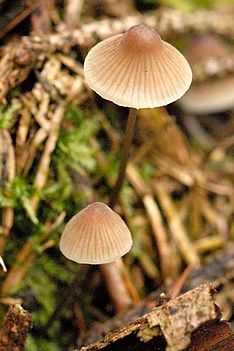Mycena flavescens
From Wikipedia, the free encyclopedia
| Mycena flavescens | |
|---|---|
 | |
| Scientific classification | |
| Kingdom: | Fungi |
| Division: | Basidiomycota |
| Class: | Agaricomycetes |
| Order: | Agaricales |
| Family: | Mycenaceae |
| Genus: | Mycena |
| Species: | Mycena flavescens |
| Binomial name | |
| Mycena flavescens Velen. (1920) | |
| Mycena flavescens | |
|---|---|
|
| |
| gills on hymenium | |
|
cap is conical or campanulate | |
| hymenium is adnexed | |
| stipe is bare | |
| spore print is white | |
| ecology is saprotrophic | |
| edibility: edible | |
Mycena flavescens is a species of Mycenaceae fungus. It was first described scientifically by the Czech mycologist Josef Velenovský in 1920, based on specimens collected in Mnichovice in 1915.[1] The mushroom is edible.[2]
References
- ↑ Velenovský J. České Houby 2. Prague: České Botanické Společnosti. p. 323.
- ↑ Boa E. (2004). Wild Edible Fungi: A Global Overview Of Their Use And Importance To People (Non-Wood Forest Products). Food & Agriculture Organization of the UN. p. 137. ISBN 92-5-105157-7.
This article is issued from Wikipedia. The text is available under the Creative Commons Attribution/Share Alike; additional terms may apply for the media files.